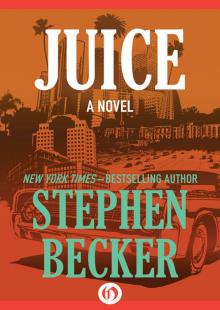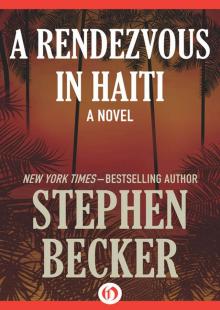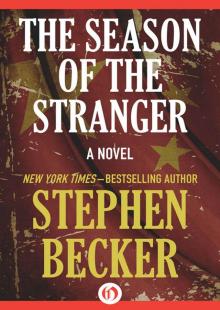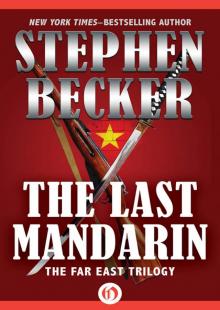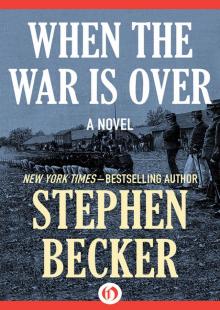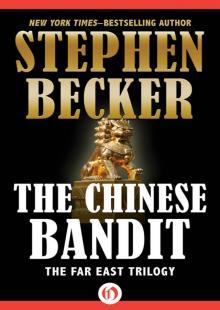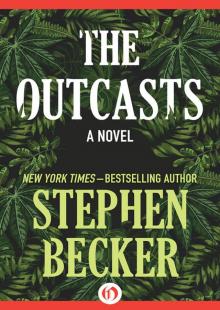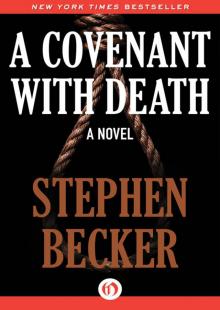Juice, page 1





EARLY BIRD BOOKS
FRESH EBOOK DEALS, DELIVERED DAILY
BE THE FIRST TO KNOW—
NEW DEALS HATCH EVERY DAY!
Juice
A Novel
Stephen Becker
1
Joseph Harrison was not the average American: he was financially secure, did not covet his neighbor’s wife, and had no “hobbies.” Still, he might walk unnoticed on a public street; he dressed elegantly but conservatively, and had no bizarre physical traits. He was tall, but not imposingly so. He was neither fat nor thin, but had an unostentatious solidity. He had pleasant features, and women thought him handsome. Men disagreed, and called him manly, unaware that for many women the two attributes are one. His hair was fine, soft, medium-cropped, and graying; younger women knew immediately that he was strong, urbane, and passionate, while older women knew immediately that he was sympathetic, tender, and understanding. Meeting him for the first time, an acute woman or an intuitive man might sense a chill, a reserve, almost an indifference. The woman would blame it on his affection for his wife; the man would label him a martinet. Each would be partially correct.
He loved his wife, which was not unusual; he had loved her unremittingly for fifteen years, which was. He also loved his work. To his wife and children he brought uninhibited, and often bawdy, fondness. To his work he brought an inordinate sense of responsibility and a competence unmatched in his field. There was, of course, a little mingling of attitudes: he was surely responsible and competent at home, and he was often cheerful and bawdy at work. He could distinguish one domain from the other, but he could not split his soul between them. Until a certain day in May (a day when death, which is in human affairs a constant, like the speed of light in physics, forced him temporarily out of both worlds and into an unknown region) he considered the two domains of equal and permanent importance. Perhaps they were. He was, to use another man’s phrase, the mainspring of both.
The other man, the phrasemaker, was Arthur Rhein, founder and chairman of the board of the Pacific American Network. If Joseph Harrison, as managing director of the network, was its mainspring, then he, Rhein, was its twenty-one jewels. He was therefore forgiven for the phrase. In ordinary converse he was a man of fair vocabulary and graceful expression, but when he discussed business he gave in to metaphor and fustian. “There is no independence without talent,” he said proudly, for instance, thinking back on his rise in the world. Or: “Crises are not to be feared, but welcomed.” He believed that success in business (which, in another mood, he called simply “money”) was largely due to the crises generated when men of talent banded together to fodder and fleece a sheepish public.
The Pacific American Network was Arthur Rhein’s unmortgaged freehold in what he otherwise considered a precariously piratical world. P.A.N. was a television channel, a radio transmitter, two newspapers with a combined circulation of over three million. P.A.N. was a small book-publishing house. P.A.N. was a theatrical weekly. P.A.N. might soon be a recording company. One way or another P.A.N. reached half of American humanity—probably more—west of the Rocky Mountains; citizens breakfasted, did laundry, made love, bet horses, squandered inheritances, graded ore, water skied, sorted oranges, read poetry, sinned and repented, devoured creatures of earth and sky, and lived through the rise or fall of personal empires, all within sight or sound of P.A.N. And this, Arthur Rhein would have been pleased to repeat, was the result of conflict. Crisis. Yes. Rhein’s daring was perhaps mitigated by his being majority stockholder of the Pacific American Insurance Company (P.A.I., of course); but he had turned his versatility to noble account by requiring P.A.N. employees to insure—life, fire, theft, auto—with P.A.I.
He was revered by most of his employees. Certainly he was revered by Marie Dumont, née Duffy and as yet unmarried, twenty-three years old, of face and form divine, or at least demiurgeous (“of an inferior, not absolutely intelligent, deity”), who, as receptionist for Joseph Harrison, played king’s sentry to a varied horde of harassed importunates. Marie Dumont had come to the West Coast in order to be near Hollywood; she was not quite silly enough to believe that her manifest beauty and ambushed talents would be mystically conveyed to the senses of a rich but honest agent at a soda fountain, but she was not quite clever enough to know that she had come west for exactly that. If the miracle had happened, she would have been no worse than a hundred current steatopygous sirens; she would have been a good deal prettier than most. Early on, there was nothing (nothing) she would not have done for “the big break.” Now, though, she had fallen upon lazy ways. She liked her work at P.A.N. She met what she called the haut monde (and spelled, in rare letters home, haute monde). That expression, and a flat, mangled merde, were her French. She had tried other phrases now and then, but had given up in weary disgust at words not pronounced as they were spelled.
The Dumont domain was not small. The reception room was some twenty-five feet square. The walls were a deep blue-purple. The carpeting, one huge wall-to-wall swatch, was a thick cream. Glass-topped tables and Scandinavian chairs were scattered at carefully plotted random. Miss Dumont worked her ravages from an unprotected desk. Behind her, and to her left, was the door to Harrison’s suite of offices. There were no windows in the reception room. Instead there were a Braque, an early Picasso, a Marin, and a Kokoschka done in blues and yellows (which should not have succeeded against the dark wall, but did, like an aggressive lodge button on a new serge suit). Visitors were invariably impressed. Those who were cold to the décor appreciated the art; and those for whom art was long and life short appreciated Miss Dumont, forgetting that judgment was difficult and experiment perilous.
Harrison, unfortunately, barely noticed Miss Dumont. Mrs. Harrison was unfailingly affable, occasionally down-right friendly, and always unpredictable. She could, Miss Dumont had decided with only a soupçon of bitterness, afford it: her figure was lovely, and her face would have qualified her for the glossier magazines. She was also unconventional, which drove Miss Dumont as close to fury as a character formed on the playing fields of Newman Grove, Nebraska, could be driven. Mrs. Harrison had, not six months before, pushed through the glass doors wearing men’s corduroy pants, ski boots, and a buckskin tunic. Of all things. A mother of two.
So, regretfully, Harrison was unreachable. Miss Dumont understood that she was, and always would be, at best a minor character, a supernumerary, in whatever the drama of Harrison’s life was, or might later be. But from nine to five each day she stood—or sat—between him and the world, which pleased her. The job had other compensations, and it paid nicely. Miss Dumont was well off, and knew it. And then there were the periodic crises. The crises were simply wonderful.
On an afternoon in late May—there had been no hint of crisis, but it was, later, a day that Miss Dumont would never forget—Marie Dumont’s reminiscences were interrupted by the unannounced and belligerent arrival of a man she liked. His name was Mort Weinstein. He was managing editor of the Intelligencer, the P.A.N. evening newspaper. He was tall, burly, and hairy. His features were not special. Marie Dumont did not know why she liked him. He was in his forties, like Joseph Harrison. His pants were too long and the knot in his tie was entirely undisciplined. He was sensuous; Miss Dumont did not know that he was a good managing editor because he derived an almost physical satisfaction from doing his work well. A good meal gratified him; a good drink gratified him; a good woman gratified him; and an honest day’s work gratified him. Metaphysics repelled him. He was a good man and a hard worker, and was happy. He was also direct, rude, tactless, wearing a $29.95 suit, and oblivious to the length of his pants or the position of his tie. He was also fairly oblivious to Miss Dumont, which she sensed. She was somewhat relieved by that. She had an idea that if he had wanted her he would simply have asked (abstractedly; while examining notes) whether she would move in with him for a while. Miss Dumont would have refused; and the nagging regret would have followed her all the days of her life.
“Harrison,” he said, looming before her. “Now. Within three minutes. I own a boat. Three minutes, or I’m in the fish business.”
“I’ll buzz him,” Marie smiled.
“Tuna,” he said. “Sunshine. Fresh air. Unlimited klabriasch. Hurry. I’m hungry.”
Marie was talking to Harrison’s secretary. Harrison was free. One moment.
Weinsten paced. “Marin,” he said. “Picasso. We’re too good for Goya. I’ll go to New York. Through the canal. More Goya in New York—nu? Is he free?”
“She’s checking,” Marie said.
“I’ll learn Italian,” he said. “Always wanted to learn Italian. Vietato di fumare. Nicht hinauslehnen. Défense de jouer avec la serrure.”
“That’s not Italian,” Miss Dumont said. She had heard avec.
“You’re right. You’re indispensable. I need you, Miss Dumont.” He was glaring at the Braque.
Miss Dumont disliked him.
Mr. Harrison would see Mr. Weinstein.
“Bravo,” Weinstein said. “Now do something for me. You will, won’t you?” he asked tenderly.
“Oh, stop it!” she said. “What do you want?”
“Two corned beef on rye, a pickle, two containers of coffee, black. Call down and have it brought up, will you?” He was on his way to the door; he looked back; she nodded.
Soon Harrison’s secretary left for a dental appointment, and Marie Dumont was cheered: the responsibility of taking telephone messages was one she loved. There were a few calls. Osterman, the program director: was Harrison free? No? What happened with Flavia Montrose?
“Of course not,” Osterman said. “She’s in New York. Joe was going to talk to her.”
“Shall I have him call you?”
“Yah, please. Before six.”
Hendricks, the lawyer: Eugene, Oregon, would come in; so would Carson City, and the FCC was in the bag. Could Harrison call him back?
Schmidt, circulation: a distributors’ strike was likely. Something would have to be done. Harrison would call back.
Henry arrived with the sandwiches and coffee. Miss Dumont smiled. Her torso twisted splendidly as she turned for her purse; she paid, tipped. Henry was normally goggle-eyed, a burgeoning adolescent in a world of billboards; carnal desire burned in him like an Olympic torch. He read novels, and delivery boys in novels did very well. Henry had been a delivery boy for eighteen months and nothing had happened; he was almost stupefied by anxiety. Miss Dumont was far too much for him. He fled. She laughed to herself.
She took the sandwiches to Harrison’s office.
“He’s coming,” Joe Harrison said.
“Sometimes I don’t give a damn,” Weinstein said. “They run the paper the way they want to. But if they ask me to run it, they run it my way.” His stomach rumbled.
“Acute borborygmus,” Harrison diagnosed.
“Corned beef,” Weinstein agreed. “Also I want two hours for lunch. I like a good meal in the middle of the day. Peps me up for the afternoon. My grandmother always—”
“Go to hell,” Harrison said. “And a good breakfast because it peps you up for the morning. And a good dinner because fornication is heavy work.”
“All right,” Weinstein said. “My health is unimportant. I only regret that I have but one life to give to P.A.N. De mortuis—”
“—non disputandum est,” Harrison finished. “Which is why I sometimes wish you were dead. Everybody else in this organization is flexible. Amenable. Negotiable, so to speak. Only you: complaints, miseries, you’re saddled with incompetents, distribution stinks, advertising stinks, circulation stinks. Not a week goes by without a cheerful visit from Old Mort Weinstein. You’re a troublemaker. A perfectionist. A subversive. We want harmony! Is that clear?” Harrison’s voice had altered; he was Arthur Rhein. It was an old joke. “Adjustment. No emery dust in the lubrication. No discord. Take music. What is music without harmony?”
Lawrence MacKenzie walked in. He was administrative director of the wire service. He was thirty-eight years old, barely plump, balding, bespectacled, and unable to admit to himself that he was unhappy about his marriage, his salary, and his rank. He could not eat tomatoes or eggplant. He rarely smiled.
Weinstein was laughing. “Good afternoon,” Harrison said. “Mort has troubles.”
“Hello, Mort,” MacKenzie said.
Weinstein, still smiling, nodded.
“Mort is at it again,” Harrison went on. “You will recall his January visit. Newsprint had gone up; his budget had not. February: he suggested that we meet the union demands—they were fair, he said, in that archaic vocabulary of his—provided they would allow him to cut away some dead wood, replacing it with good men. He also proved, in his non-Euclidian way, that it would be economical. His suggestion broke the deadlock, which placed a further strain on his already overweening vanity. March: now what was it in March?”
“The new presses.” Mort smiled.
“Aha. The new presses. Buying basic machinery in a period of tight money. Weinstein is, in short, a radical. An unreliable element. Long on work, long on results, but perilously short on group spirit. Hell,” he said, “I can’t keep this up. Mort has another problem. I want you to straighten it out, in my name, and do it Mort’s way, you hear?”
MacKenzie, who had wavered between frown and smile, now frowned. “Why didn’t you come to me?” he asked Weinstein.
Weinstein exhaled ponderously. “Because this thing was bigger than both of us.”
“All right,” MacKenzie said. “What’s the trouble?”
“Our own wire service,” Harrison said flatly. “They hold out on the paper. They get squibs to Marshall just in time for the late TV news; they don’t get them to Mort in time for his last edition. A week ago they had news on the air at seven. Mort got it officially at seven-fifty. The worst is that it’s mostly local stuff. World news is duplicated anyway, on the other wires. But local stuff is more important to Mort than it is to Marshall; people don’t go to the TV news for items about noodling in Santa Barbara. And because it’s small stuff, it isn’t worth it for Mort to replate at the last minute. He needs it when it comes in.”
MacKenzie nodded. “Any idea why?” he asked Weinstein.
“I don’t know,” Weinstein said slowly.
“Womack has never liked Mort,” Harrison said. “I don’t know why; I can guess. The reason is unimportant at the moment.”
MacKenzie nodded without expression. He too could guess. Womack was a narrow-minded man. MacKenzie had never thought much about Jews, but he did not like the way Mort made him feel. Mort was not handsome, to begin with, or even clean-cut. It was a question of inspiring confidence. But then MacKenzie did not like the way Harrison made him feel.
“Womack resents anybody who works hard and screams and insists on the best,” Harrison went on. “Womack thinks a paper should be like a house organ. He doesn’t trust originality and he doesn’t like mavericks. I know for sure he doesn’t like me. But I’m too high up. So he knifes Mort. Tomorrow he knifes Larry MacKenzie. You stop him, Larry. If you have to, you can tell him everything I’ve said here today. You can tell him I don’t care how or through whom he got his job. One more complaint like this and he’s out. Tell him he’s a damn fool, too; the wire-service stuff has the hour marked on it. He should know better. Tell him even if I didn’t care who he feuded with, I’d be down on him because he’s a damn fool. And you—” he turned to Weinstein—“don’t wait a week next time. You can’t handle anything like this yourself; you’re not supposed to; you’re not paid to; you haven’t the authority. Come straight to me. You hear? The paper’s the best product we have. And you—” he turned to MacKenzie—“can forget that you heard me say that. Clear? If it gets back to me you can turn in your overalls.”
“Okay,” MacKenzie said.
“Right,” Weinstein said.
“Now get out of here,” Harrison said. “I have to call a lady.” He picked up his telephone. “Get me Flavia Montrose at the Pierre.… Yes. New York.”
Weinstein waved.
“Wait a minute,” Harrison said. “You go along, Larry.”
MacKenzie left.
“Come out, Mort,” Harrison said. “Every time I see you I ask you. We’ll kill a bottle of liquor and talk about the world. Bring a girl if you want. Helen likes you. You’re a hero to Mike anyway. He wants a press card for his birthday.”
“I will,” Weinstein said. “I really will. I’ll call you. I’ll bring Mike a hat that curls up in front.”
Harrison laughed. “Good. Make it soon, will you?”
Flavia, Joe Harrison was thinking. Flavia Montrose. Jo Ann Jenks, or something, from Moose Jaw, Saskatchewan, or someplace. Pushing forty and oh so sleek, but the public loved her. Even Broadway hadn’t seen through her. They loved her. So I must have her. Oh, yes, I must have her. If it costs twenty thousand bucks. P.A.N. brings you Flavia Montrose in her first television appearance. Sheridan: they’ll love it—low-cut. Humanity, wonderful humanity. Sell their birthright for a mess of cleavage. So? What else? Utopia? Assless society? Good line: mobility of the asses. Governing asses. Working asses.
“Hello, hello,” he said. “What’s the matter here?”
“I have New York,” his secretary said. “They’re ringing Miss Montrose.”
“Good.”
“Miss Montrose does not answer,” a voice said.
“When will she be back?” Harrison cut in.
“I don’t know, sir, I’m sorry.”
“All right. Ask her to call Joe Harrison on the Coast, will you? She has the number.”
“I’ll leave the message, sir.”
“Thanks.”
“Mr. Rhein is on another wire,” Miss Dumont said.
“Good God,” Harrison said. “Put him on.”

